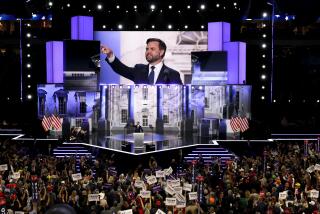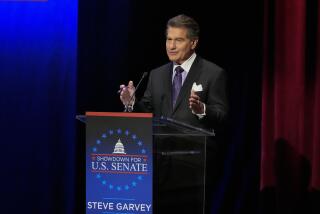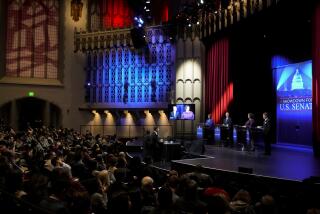Gives Tempered Speech to World Affairs Council in L.A. : Quayle Foresees ‘Century of Peace’
- Share via
In an important test of how he is bearing up and blossoming out under the pressures of the national campaign, Sen. Dan Quayle went before the Los Angeles World Affairs Council Thursday to deliver a calm, temperate account of the GOP platform on foreign affairs--and to field some carefully screened questions from a knowledgeable audience.
Partisans found their reasons to cheer or jeer the GOP vice presidential nominee’s performance, which left his listeners neither electrified nor running for the exits.
But Republican campaigners took satisfaction enough that Quayle tackled this complex subject in detail before a distinguished audience and left with his head high.
He was interrupted by applause nearly a dozen times as he spoke and answered questions. But only half of the very Establishment audience was willing to give him a standing ovation. A scattering of post-luncheon interviews found that some Quayle doubters had been won over.
‘Century of Peace’
In his remarks, Quayle presented a vision of a world that could be on the verge of “a century of peace” if America sticks to its guns and its policies.
His was an accommodating, wait-and-see vision of improving U.S.-Soviet relations, notable for its moderate and knowledgeable tone, not for its initiatives.
Of Soviet policies of openness and reform, Quayle said: “The significance of these policies is still uncertain. We can hope they will lead to a less expansionist Soviet Union, to a Soviet Union which tries to soothe international tensions.”
The speech carried none of the partisan sting typical in his ordinary campaign appearances.
“American leadership in the world can be successful only if we follow the approach of the late great senator from Washington, (Henry M.) Scoop Jackson, who argued that, in terms of national security, the best politics is no politics,” Quayle said.
However, he called on Congress to reduce its voice in matters of the use of American troops abroad by repealing the War Powers Act.
The two-term Indiana senator did not shy from the conservative GOP commitment to continued military modernization and buildup. He described the space-based Strategic Defense Initiative as “the margin of survival for American citizens.”
Finally, Quayle called for greater “burden sharing” by American allies Germany and Japan for the common defense of global interests.
“As their economic power grows, so does their responsibility,” he said.
During a half-hour of questioning, only written inquiries were permitted and only on subjects directly pertaining to the substance of Quayle’s speech.
The unexpected change in procedure was ordered by the council’s new president, J. Curtis Mack, a former official in the Reagan Administration Department of Commerce.
In the past, questions were asked directly from the floor without screening.
Council officials said the change was an effort to raise the standard of decorum for crowds like Thursday’s 1,300. But several members of the audience complained to reporters that the rules were being changed to benefit Quayle.
“If I’d known this, I would have just sent a messenger with my questions in an envelope,” activist attorney Gloria Allred said.
In the end, though, hers was one of the questions read to Quayle: Does he support the neutron bomb, a weapon with the capability of killing people but inflicting less damage on structures.
“I do not believe that is a viable option of us to pursue,” he replied.
Richard Widrig of Sherman Oaks, a GOP supporter in the audience, said Quayle showed a “grasp of foreign affairs and a global view. It helped convince me this guy was not as dumb a person as I thought.”
Marc Harwitt, a Santa Monica doctor, was less impressed: “He showed he could stand up there and read a speech, and that’s about all.”
Quayle, by virtue of his experience in Congress and his political interest, considers foreign affairs to be his strongest suit, and this was his third and most significant speech on the subject in his month-old candidacy.
In his first, in Chicago, he wandered off the prepared text and reviews were generally awful. He performed better a second time in Denver, but the challenge was lessened because the campaign selected an audience sure to be friendly. He has also sometimes come up short in answering questions from an audience.
This time, his handlers from GOP campaign headquarters were so concerned about how he would perform that Quayle was taken to the Century Plaza an hour early in order to familiarize him with the ballroom and the TelePrompTer.
He is having to learn to read his speeches because campaign officials do not want him to follow his practice of talking off-the-cuff.
Given past problems and the frequent portrayal of the 41-year-old Quayle as a tenderfoot on the national stage, forums like the World Affairs Council are important opportunities to improve his image.
Some who were seeing the senator for the first time left unimpressed with his deliberate word-by-word reading.
Susan Silver, a Los Angeles screenwriter, said: “It was as though he was in a slow learners’ class.”
But those who have watched him struggle for the last month found it one of his most flawless performances.
“He did fine,” said Stuart K. Spencer, the strategist assigned to help Quayle along this campaign. “I’m happy.”
Less happy was California’s Democratic senator, Alan Cranston, who read Quayle’s text and issued a statement in Washington, saying: “That speech is about as deep as a desert stream in July.”
Cranston said Vice President George Bush, the GOP candidate for President, showed poor judgment and “political cynicism” in not selecting a running mate better qualified intellectually and emotionally than Quayle.
“Instead, he chose someone whom he thought might appeal to certain voters before the election--and remain an obedient and docile house pet afterwards,” Cranston said. “Someone in the mold of George Bush himself.”
Staff writers Keith Love, Robert Scheer and John Spano in Los Angeles and William J. Eaton in Washington contributed to this story.
More to Read
Get the L.A. Times Politics newsletter
Deeply reported insights into legislation, politics and policy from Sacramento, Washington and beyond. In your inbox twice per week.
You may occasionally receive promotional content from the Los Angeles Times.










